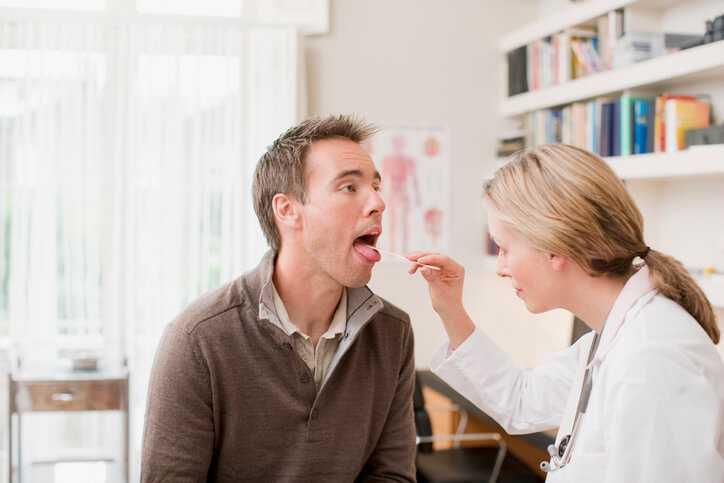
What are the symptoms of oral thrush?
Oral thrush is an infection in the mouth and throat caused by a fungus called Candida. It is usually mild and can be treated with medicines from a pharmacy – but if left untreated it can spread to other areas of the body[1]. Knowing the symptoms of oral thrush can help you to recognise it quickly and treat it before it can spread.
What symptoms can oral thrush cause?
Although it is common in babies and people with dentures, anyone can get oral thrush. In adults, it is usually characterised by white patches in the mouth and throat, which bleed if you wipe them away. Other symptoms include:
- A complete or partial loss of taste
- Dry mouth
- Cracks at the edge of the mouth
- Difficulty eating and drinking
- A bad taste in the mouth
Usually, oral thrush is not contagious in adults.
Babies can also get white patches in their mouth if they have oral thrush. Additionally, they might get a thick white coating on their tongue that looks a bit like cottage cheese and doesn’t come off easily. Reluctance to feed and nappy rash are also symptoms of oral thrush in babies. When breastfeeding, babies can pass on thrush, causing nipple thrush in the mother[2].
Can oral thrush cause a tickly cough?
Some people who have oral thrush also get a tickly cough as a result of the yeast infection. This is likely due to the infection irritating your mouth and throat. Oral thrush can dry out your mouth, which may also give you a tickly cough. Staying hydrated may help to relieve this symptom[1].
It’s important to note that oral thrush doesn’t usually cause a chesty cough. If you’re coughing up mucus that isn’t white like the spots in your mouth, your cough is likely to be caused by something else, such as a cold, flu or other infection.
Can oral thrush cause a sore throat?
Oral thrush may also cause a sore throat, particularly if left untreated. This is usually a mild symptom in adults, but babies who experience sore throats as a result of oral thrush can find it very distressing. They may cry more and be unable to settle, and this may contribute to a reluctance to feed[1].
For adults, a sore throat caused by oral thrush should go away when the infection has run its course. In the meantime, over the counter medications such as Chloralieve’s soothing throat lozenges may help to relieve the symptom, allowing you to get on with your day.
Can oral thrush cause swollen lymph nodes?
If you have a sore throat with oral thrush, you may also experience swollen lymph nodes. This is because the yeast infection is triggering your immune response, causing inflammation[1].
There are also many other infections and illnesses that can cause swollen lymph nodes, so it’s important to check whether you have other symptoms of oral thrush as well. Other possible causes include colds, flu, glandular fever, tonsillitis and many more[3].
Can oral thrush cause acid reflux?
Usually, oral thrush doesn’t cause acid reflux. However, it can cause similar symptoms such as heartburn if the thrush spreads into the oesophagus. This is why it is so important to treat oral thrush quickly with pharmacist-approved medicines.
Acid reflux can also be caused by eating too quickly, lying down after eating, or a chronic condition such as gastro-oesophageal reflux disease (GORD). If you suspect you have acid reflux, speak to a doctor who should be able to help you find out the exact cause and decide on a plan for treatment[4].
Resources:
[1] https://www.nhs.uk/conditions/oral-thrush-mouth-thrush/
[2] https://www.nhs.uk/conditions/baby/breastfeeding-and-bottle-feeding/breastfeeding-problems/thrush/
[3] https://www.nhs.uk/conditions/swollen-glands/
[4] https://www.nhs.uk/conditions/heartburn-and-acid-reflux/
